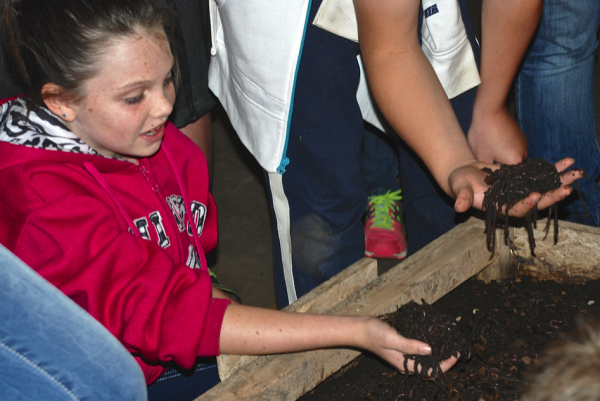

WILTON – While a shortage of earthworm castings across the country had people clamoring for the soil enriching product this summer, a local business decided to seize the opportunity and commercially raise their own.
In a former G.H. Bass warehouse at the back of the Western Maine Development complex off Weld Road, 750,000 worms are hard at work producing the world’s richest natural fertilizer to be sold as Earth Keeper Castings.
John Black points to a tall, 100-ton pile of worm castings, also known as vermicast, worm humus or worm manure, that his hundreds of thousands of earthworms have produced in a few short months by eating a mixture of shellfish compost, peat moss and a little protein grain for the worms.
While they digest the soil mixture, the earthworms add their own biological magic before leaving behind a tiny pellet-like substance that contains all kinds of beneficial bacteria and enzymes. When the castings are added to a garden’s soil, the plant systems nearby absorb nutrients easier and help build a better soil structure.
On a fact-finding tour of the facility first thing Wednesday morning, 30 members of the The Spruce Mountain Area Robotics Team (SMART) were on a mission to learn as much as they can about waste management, including the new commercial worm casting production facility.
The students, led by science teacher Rob Taylor, are preparing for the next FIRST LEGO League qualifying competition to be held at Spruce Mountain on Nov. 21. Part of that competition will include a research project on a particular waste management issue they have explored and make a presentation on their creative solution.
The students first toured the town of Jay’s transfer station then headed over to Wilton to see the earthworm casting production established a year ago by John and Corey Black of Rocky Hill Landscaping in East Wilton.
Students viewed the piles of shellfish compost, peat moss and a little feed grain be screened, tumbler mixed and poured into wooden boxes where 8,000 to 10,000 “red wigglers” earthworms are added.
For two weeks, the boxes of worms and soil mixture are kept in a temperature-controlled building to allow for optimum digestion of all the materials to take place. Then it’s on to the conveyer and shake table to simultaneously screen for three products: castings, worms and their eggs produced.
It took about six months to set up equipment needed for the operation, Black said. Before that, he conducted his own research trip out west to look at other casting production facilities then returned to redevelop designs so that they would work for his location, operation size, and budget.
There has been some refining of the casting production along the way, Black told the students. They started with 250 worms in lots of pails of soil and soon found it to be too labor intensive so they built 12 cubic-foot-size wooden boxes that can feed up to 10,000 worms for two weeks. That change made it a whole lot easier to produce a whole lot more worm castings every two weeks.
“That saved us 12 hours of labor a day going from pails to boxes,” he said. Maintaining the boxes at an optimal temperature was found to be important too. If a box of soil mixture got too warm, the worms would scramble to the cooler surface.
“We’d come in and find 10,000 worms in a big ball sitting on the top,” Black said. These worms can’t take anything under 50 degrees so an insulated room was built to keep the temperature just right.
During each 14-day session, the worms will lay about one amber-colored egg that’s about the size of half a BB pellet. Each egg will produce between two and eight worms. They hatch best at a temperature of about 80 degrees. Earthworms produce the most eggs during their first two years of life. Black estimates their age by averaging the weight of 200 worms. A worm in the best conditions, like the casting production facility, can live five years.
Taylor told his students that the operation the Blacks designed and developed “is innovation at its best” and exactly what the FIRST LEGO League competition calls for from its participants. The students also quizzed Black on keeping worms happy because Taylor’s science classroom has a small worm casting production under study.
While Rocky Landscaping sells one cubic-foot bags of its Earth Keeper Castings locally, it is currently negotiating to sell it in bulk to stores interested in adding worm castings to enrich soil mixtures and be sold through large retailers like Home Depot and Walmart.
The Blacks hope to be moving their worm casting production into the former tannery facility in East Wilton before winter hits.






Love the creativity and work ethic.
It’s been done for years. But because of the big boom in medical marijuana,its now a very viable big business. It’s my understanding the blacks are or were, also growing medical marijuana.a business in rangeley called “fix it farm” has been doing this for a few years now,and has been selling lots! There’s also a business in new Sharon that’s been making organic “dirt” for many years!